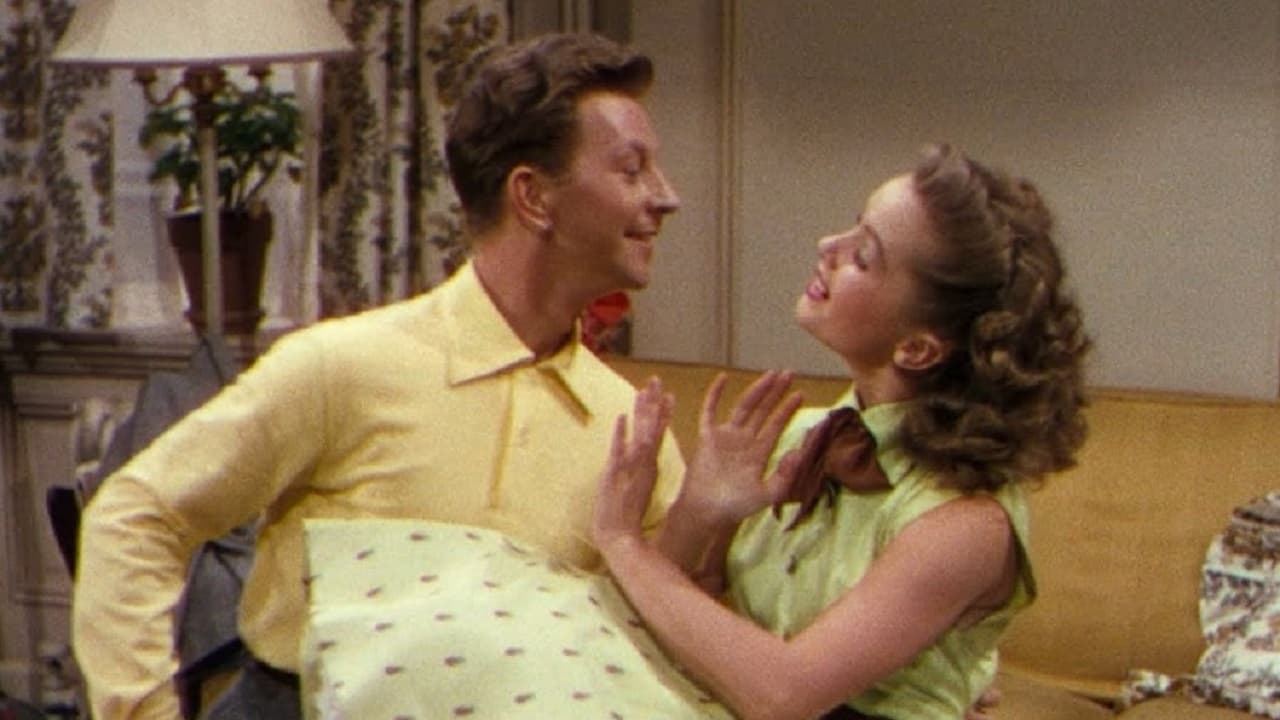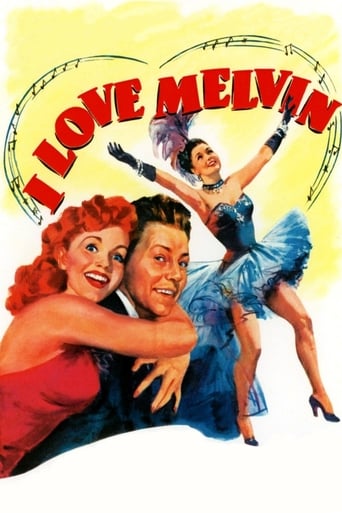

Very disappointed :(
... View MoreThat was an excellent one.
... View MoreNice effects though.
... View MoreA great movie, one of the best of this year. There was a bit of confusion at one point in the plot, but nothing serious.
... View MoreYes, "I Love Melvin" is formula, but sometimes formula provides nutrition. If indeed that is true, then the cast of this pleasing musical comedy is overdosing on nutrients. Donald O'Connor plays a Look Magazine Employee, assistant to photographer Jim Backus, who longs to make the grade and cease running errands for his boss. He takes pictures of rising Broadway ingénue Debbie Reynolds whom he slowly falls in love with in spite of the fact that her father (Allyn Joslyn) is trying to push her together with the boringly handsome Richard Anderson. But O'Connor tries to win over pop Joslyn and mama Una Merkel's affections by presenting a fake cover of "Look" with Reynolds on the cover. How will he explain when "Philly of the Month" ends up being a prizefighter? There are more musical numbers in this that actually seem to be moving the plot along than "drop-ins" or on-stage numbers, although Reynolds humorously portrays a football in one, her Broadway show which appears to be the "Good News" of its day. She also has two dream sequences where she's a movie star (I guess a Broadway one isn't big enough in MGM's eyes) including one where she resembles Ginger Rogers while dancing with several men in hideous Fred Astaire masks. They are delightful spoofs of the Hollywood image, and the over-the-top grotesqueness is appropriate. Impish Donna Corcoran playfully sings a delightful ditty, "Life Has Its Funny Little Ups and Down", which O'Connor does a roller skate dance to that just about equals his "Make Em' Laugh" in the previous year's "Singin' in the Rain". Then, he has his big solo, "I Wanna Wander", during which you'll expect him to pass out from due to exhaustion. In typical MGM fashion, all ends happy (as MGM musicals should) and smiles are guaranteed.
... View MoreUndemanding but energetic fare from MGM teaming the vivacious Debbie Reynolds as the day-dreaming dancing football and the late Donald O'Connor as the goofy magazine gopher who wants to put her on the front cover. It's hardly "Singin' in the Rain" but it does have glorious Technicolor, a snappy dance number set in a park, and a memorable song in "The Lady Loves" (which doubles as a glamour showcase for Reynolds). Nice cameo from Robert Taylor too!
... View MoreDonald O'Connor should be revered as the musicals god he was (and still very probably could be). "I Love Melvin" should be considered a classic, right up with the rest of the musicals. I guess life really isn't fair, lol.As cute as they come, and with Debbie Reynolds, to boot!
... View MoreIt is a commonplace that the 1950s was the Golden Age of the Hollywood musical, especially the MGM model. This not only means a profusion of classics such as 'An American in Paris', 'Singin' in the Rain', 'the Band Wagon' and 'Gigi', but also a string of second-order films of exceptional quality. 'I love Melvin' is one of these. Compared to the first films I mentioned, it is definitely an inferior product - Don Weis has neither the visual flourish or emotional realism of a Minnelli or a Donen; the stars, Donald O'Conner and Debbie Reynolds, pleasant verging on irritating, are not of the first rank, and seem exposed without their most-famous co-star, Gene Kelly, while the supporting cast is generally unmemorable; the songs are mediocre and the choreography routine; the sets are clever and pretty, but do not reveal any great truths about characters' feelings. I mention all this to show the difference between a great MGM musical and a good one. 'Melvin' is a good musical, but a very entertaining film, especially in the era of Kazan and 'Marty'.'Melvin' boasts two knockout numbers (well, three, but the amazing football dance is more clever than exhilirating). The film opens with a beautiful film-within-a-film sequence, as a crew wait for Julie LeRoy to perform her musical number. This is basically a sexless variation on 'Diamonds are a Girl's Best Friend', but the gorgeous bright colours, Debbie's flaming dress against a cool yellow background, and inventive-within-its-limits choreography, are lovely.The second elaborate sequence involves Melvin mooning about an empty photographers' set, also yellow, surreptitiously sticking up pictures of Judy in the hope that she'll be noticed and put on the cover. He goes through a variety of routines and costume changes which reveal the transfigurative effect his love for Julie has on him. The set is beautiful to look at, but vacuous in emotional terms; Weis' direction is too grounded, his camera movements laboriously signalled, rather than the urges of an overspilling heart; O'Conner's personality has become considerably less charming since 'Make 'Em Laugh', but it's all good stuff.These two numbers are crucially connected in that they are both fantasy sequences, dreamed by characters with huge ambitions, but hemmed in by economic circumstances. This treatment of the working class is rare in the Hollywood musical, rare in that, unlike 'West Side Story', class isn't a suffocating trauma, but a very real barrier to prosperity and happiness. Judy's change of name from Schneider to leRoy maybe simply a desire for the exotic, but also suggests a reaction to an anti-Semitism very prominent in the American society of the 1950s. it would be stretching things to compare 'Melvin' to a full-blown critique of the family and conformist AMerica such as 'Bigger than life' or 'Written on the wind', but the film doesn't shy away from tensions, such as the generational gap between a mother who meekly serves her husband, and a daughter determined to earn a career for herself; or an employment situation where workers are expected to take any old rubbish from their employers (plus ca change...). It is significant that Melvin should have no family background - this freedom is surely part of his attraction for Judy. They are connected by a different bond, the symmetry of the plot and mise-en-scene, which is continually playing them off one another, always reuniting them, like lines of a triangle. This structural artifice complicates an apparently simple dichotomy between authenticity/nature and capitalism/consumerism/fakery - Judy and Melvin meet in a park and eventually reunite there; their love is endangered by Melvin creating a fake magazine for her. His job as a photographers' assistant, his taking 'thousands' of pictures of Judy, his pretending to be someone else, create a world where identity is unstable, perhaps a riposte to a society where everybody is expected to be the same. At any rate, that park is pure artifice, the yellow and green of the hedge matched by the dresses of its users. In such a world fantasy (and the whole climax is possibly Judy's concussed delusion) is the only suppository for individuality and imagination.
... View More